By Russell A. Berman · Monday, September 15, 2014 Telos 168 (Fall 2014) is now available for purchase in our store.
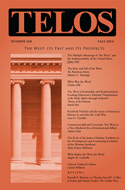 This special issue of Telos investigates the concept of the West. Far more than a geographical term, in intellectual, philosophical, and cultural history, it has been common to speak of a Western tradition in order to name lineages of thought from antiquity to the modern world. In cultural and political debates, Western values are invoked that are linked historically to a deep tradition specifically dedicated to desiderata such as freedom and individual dignity: at stake is the general possibility of any long-term tradition, the durability of culture over time, but also this very specific, distinctively Western tradition as the carrier of particular values. Politically this usage explains the reference to Western democracies (as opposed to the “peoples’ democracies” of the Soviet era) with the suggestion that democratic political forms and norms have emerged from the “Western tradition” and have generated the institutions of both liberal democracy, i.e., democratic procedures that assert popular sovereignty, while simultaneously protecting individual rights, and market economies shaped by the rule of law and the protection of private property. This special issue of Telos investigates the concept of the West. Far more than a geographical term, in intellectual, philosophical, and cultural history, it has been common to speak of a Western tradition in order to name lineages of thought from antiquity to the modern world. In cultural and political debates, Western values are invoked that are linked historically to a deep tradition specifically dedicated to desiderata such as freedom and individual dignity: at stake is the general possibility of any long-term tradition, the durability of culture over time, but also this very specific, distinctively Western tradition as the carrier of particular values. Politically this usage explains the reference to Western democracies (as opposed to the “peoples’ democracies” of the Soviet era) with the suggestion that democratic political forms and norms have emerged from the “Western tradition” and have generated the institutions of both liberal democracy, i.e., democratic procedures that assert popular sovereignty, while simultaneously protecting individual rights, and market economies shaped by the rule of law and the protection of private property.
Continue reading →
By Russell A. Berman · Monday, June 16, 2014 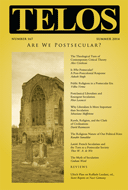 Critical theory inherited classical accounts of social change that linked modernization processes to secularization: in order for societies to overcome traditionalist structures and pursue the accelerated development of modernity, they would have to escape the grip of religion. This is perhaps most famously the case for Marx, who, in the introduction to his Critique of Hegel’s Philosophy of Right, declared religion “the opium of the people,” blocking the way of progress: “The abolition of religion as the illusory happiness of the people is the demand for their real happiness. To call on them to give up their illusions about their condition is to call on them to give up a condition that requires illusions. The criticism of religion is, therefore, in embryo, the criticism of that vale of tears of which religion is the halo.” To surmount a social condition that produces unhappiness requires renouncing the systematic concealing of that condition which is, so Marx, the genuine function of religion, the ultimate paradigm of ideology as false consciousness. Critical theory inherited classical accounts of social change that linked modernization processes to secularization: in order for societies to overcome traditionalist structures and pursue the accelerated development of modernity, they would have to escape the grip of religion. This is perhaps most famously the case for Marx, who, in the introduction to his Critique of Hegel’s Philosophy of Right, declared religion “the opium of the people,” blocking the way of progress: “The abolition of religion as the illusory happiness of the people is the demand for their real happiness. To call on them to give up their illusions about their condition is to call on them to give up a condition that requires illusions. The criticism of religion is, therefore, in embryo, the criticism of that vale of tears of which religion is the halo.” To surmount a social condition that produces unhappiness requires renouncing the systematic concealing of that condition which is, so Marx, the genuine function of religion, the ultimate paradigm of ideology as false consciousness.
Continue reading →
By Russell A. Berman · Wednesday, March 19, 2014 Telos 166 (Spring 2014) is now available for purchase in our store.
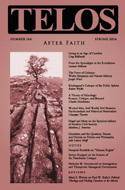 According to the secularization thesis, religious faith should have long ago disappeared, overwhelmed by the forces of progress. Yet while explicit membership in denominational communities is certainly less an obligatory feature of contemporary culture than it was a generation or two ago, modes of religion still play important roles in aspects of social life. This issue of Telos explores some of the ramifications of this afterlife of faith. According to the secularization thesis, religious faith should have long ago disappeared, overwhelmed by the forces of progress. Yet while explicit membership in denominational communities is certainly less an obligatory feature of contemporary culture than it was a generation or two ago, modes of religion still play important roles in aspects of social life. This issue of Telos explores some of the ramifications of this afterlife of faith.
Continue reading →
By Russell A. Berman · Monday, December 16, 2013 Telos 165 (Winter 2013) is now available for purchase in our store.
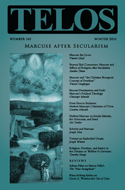 To choose Herbert Marcuse and religion as the topic for a special issue might seem strikingly anachronistic. Formed by the collapse of the Weimar Republic and the rise of Nazism, Marcuse worked in the OSS during the Second World War, and later, in his mature theoretical works, such as Eros and Civilization and One-Dimensional Man, he grew into the cultural critic who would become a prominent mentor of the student revolt of the 1960s, especially in the United States and Germany. This is a stirring narrative, no doubt, but does it not simply belong to another era? To be sure, historical distance is hardly an argument against intellectual inquiry, and one could certainly dedicate an issue to filling out a detailed account of how this philosopher became a public intellectual in the context of the upheavals of his age. Yet every historical study of the past also bears the marks of the present, including the question marks that punctuate our own, current queries in this issue of the journal. What does Marcuse have to say to us today? That consideration is always germane, but especially in Telos, which has set for itself the task of developing a critique of the contemporary. To choose Herbert Marcuse and religion as the topic for a special issue might seem strikingly anachronistic. Formed by the collapse of the Weimar Republic and the rise of Nazism, Marcuse worked in the OSS during the Second World War, and later, in his mature theoretical works, such as Eros and Civilization and One-Dimensional Man, he grew into the cultural critic who would become a prominent mentor of the student revolt of the 1960s, especially in the United States and Germany. This is a stirring narrative, no doubt, but does it not simply belong to another era? To be sure, historical distance is hardly an argument against intellectual inquiry, and one could certainly dedicate an issue to filling out a detailed account of how this philosopher became a public intellectual in the context of the upheavals of his age. Yet every historical study of the past also bears the marks of the present, including the question marks that punctuate our own, current queries in this issue of the journal. What does Marcuse have to say to us today? That consideration is always germane, but especially in Telos, which has set for itself the task of developing a critique of the contemporary.
Continue reading →
By Russell A. Berman · Tuesday, December 10, 2013 The National Council of the American Studies Association has voted to endorse a boycott of Israeli academic institutions. That decision is now subject to a ratification vote by the ASA’s membership, which will be completed on Dec. 15.
While the ASA website prominently displays support for the boycott, it has to date not given equal play to the many opponents of the boycott within the association. In order to give space to the ASA dissidents and in the interest of academic freedom, Telos publishes the following documents: a communication by former ASA President Shelley Fisher Fishkin to Executive Director John Stephens, of Dec. 8, and a Letter in Opposition to the boycott signed by numerous ASA members, including seven former presidents.
Continue reading →
By Russell A. Berman · Monday, June 24, 2013 Telos 163 (Summer 2013) is now available for purchase in our store.
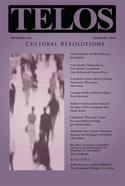 Profound change in society may involve shifting control of political power, the character of economic systems, or access to resources, but it can also have to do with the structures of meaning we bundle together in various understandings of culture. This issue of Telos looks at the explosive forces located specifically in the intangible dimensions of culture and how they may play out in revolutionary or counter-revolutionary processes. Profound change in society may involve shifting control of political power, the character of economic systems, or access to resources, but it can also have to do with the structures of meaning we bundle together in various understandings of culture. This issue of Telos looks at the explosive forces located specifically in the intangible dimensions of culture and how they may play out in revolutionary or counter-revolutionary processes.
Continue reading →
|
|
 This special issue of Telos investigates the concept of the West. Far more than a geographical term, in intellectual, philosophical, and cultural history, it has been common to speak of a Western tradition in order to name lineages of thought from antiquity to the modern world. In cultural and political debates, Western values are invoked that are linked historically to a deep tradition specifically dedicated to desiderata such as freedom and individual dignity: at stake is the general possibility of any long-term tradition, the durability of culture over time, but also this very specific, distinctively Western tradition as the carrier of particular values. Politically this usage explains the reference to Western democracies (as opposed to the “peoples’ democracies” of the Soviet era) with the suggestion that democratic political forms and norms have emerged from the “Western tradition” and have generated the institutions of both liberal democracy, i.e., democratic procedures that assert popular sovereignty, while simultaneously protecting individual rights, and market economies shaped by the rule of law and the protection of private property.
This special issue of Telos investigates the concept of the West. Far more than a geographical term, in intellectual, philosophical, and cultural history, it has been common to speak of a Western tradition in order to name lineages of thought from antiquity to the modern world. In cultural and political debates, Western values are invoked that are linked historically to a deep tradition specifically dedicated to desiderata such as freedom and individual dignity: at stake is the general possibility of any long-term tradition, the durability of culture over time, but also this very specific, distinctively Western tradition as the carrier of particular values. Politically this usage explains the reference to Western democracies (as opposed to the “peoples’ democracies” of the Soviet era) with the suggestion that democratic political forms and norms have emerged from the “Western tradition” and have generated the institutions of both liberal democracy, i.e., democratic procedures that assert popular sovereignty, while simultaneously protecting individual rights, and market economies shaped by the rule of law and the protection of private property.  Critical theory inherited classical accounts of social change that linked modernization processes to secularization: in order for societies to overcome traditionalist structures and pursue the accelerated development of modernity, they would have to escape the grip of religion. This is perhaps most famously the case for Marx, who, in the introduction to his Critique of Hegel’s Philosophy of Right, declared religion “the opium of the people,” blocking the way of progress: “The abolition of religion as the illusory happiness of the people is the demand for their real happiness. To call on them to give up their illusions about their condition is to call on them to give up a condition that requires illusions. The criticism of religion is, therefore, in embryo, the criticism of that vale of tears of which religion is the halo.” To surmount a social condition that produces unhappiness requires renouncing the systematic concealing of that condition which is, so Marx, the genuine function of religion, the ultimate paradigm of ideology as false consciousness.
Critical theory inherited classical accounts of social change that linked modernization processes to secularization: in order for societies to overcome traditionalist structures and pursue the accelerated development of modernity, they would have to escape the grip of religion. This is perhaps most famously the case for Marx, who, in the introduction to his Critique of Hegel’s Philosophy of Right, declared religion “the opium of the people,” blocking the way of progress: “The abolition of religion as the illusory happiness of the people is the demand for their real happiness. To call on them to give up their illusions about their condition is to call on them to give up a condition that requires illusions. The criticism of religion is, therefore, in embryo, the criticism of that vale of tears of which religion is the halo.” To surmount a social condition that produces unhappiness requires renouncing the systematic concealing of that condition which is, so Marx, the genuine function of religion, the ultimate paradigm of ideology as false consciousness.  According to the secularization thesis, religious faith should have long ago disappeared, overwhelmed by the forces of progress. Yet while explicit membership in denominational communities is certainly less an obligatory feature of contemporary culture than it was a generation or two ago, modes of religion still play important roles in aspects of social life. This issue of Telos explores some of the ramifications of this afterlife of faith.
According to the secularization thesis, religious faith should have long ago disappeared, overwhelmed by the forces of progress. Yet while explicit membership in denominational communities is certainly less an obligatory feature of contemporary culture than it was a generation or two ago, modes of religion still play important roles in aspects of social life. This issue of Telos explores some of the ramifications of this afterlife of faith.  To choose Herbert Marcuse and religion as the topic for a special issue might seem strikingly anachronistic. Formed by the collapse of the Weimar Republic and the rise of Nazism, Marcuse worked in the OSS during the Second World War, and later, in his mature theoretical works, such as Eros and Civilization and One-Dimensional Man, he grew into the cultural critic who would become a prominent mentor of the student revolt of the 1960s, especially in the United States and Germany. This is a stirring narrative, no doubt, but does it not simply belong to another era? To be sure, historical distance is hardly an argument against intellectual inquiry, and one could certainly dedicate an issue to filling out a detailed account of how this philosopher became a public intellectual in the context of the upheavals of his age. Yet every historical study of the past also bears the marks of the present, including the question marks that punctuate our own, current queries in this issue of the journal. What does Marcuse have to say to us today? That consideration is always germane, but especially in Telos, which has set for itself the task of developing a critique of the contemporary.
To choose Herbert Marcuse and religion as the topic for a special issue might seem strikingly anachronistic. Formed by the collapse of the Weimar Republic and the rise of Nazism, Marcuse worked in the OSS during the Second World War, and later, in his mature theoretical works, such as Eros and Civilization and One-Dimensional Man, he grew into the cultural critic who would become a prominent mentor of the student revolt of the 1960s, especially in the United States and Germany. This is a stirring narrative, no doubt, but does it not simply belong to another era? To be sure, historical distance is hardly an argument against intellectual inquiry, and one could certainly dedicate an issue to filling out a detailed account of how this philosopher became a public intellectual in the context of the upheavals of his age. Yet every historical study of the past also bears the marks of the present, including the question marks that punctuate our own, current queries in this issue of the journal. What does Marcuse have to say to us today? That consideration is always germane, but especially in Telos, which has set for itself the task of developing a critique of the contemporary.  Profound change in society may involve shifting control of political power, the character of economic systems, or access to resources, but it can also have to do with the structures of meaning we bundle together in various understandings of culture. This issue of Telos looks at the explosive forces located specifically in the intangible dimensions of culture and how they may play out in revolutionary or counter-revolutionary processes.
Profound change in society may involve shifting control of political power, the character of economic systems, or access to resources, but it can also have to do with the structures of meaning we bundle together in various understandings of culture. This issue of Telos looks at the explosive forces located specifically in the intangible dimensions of culture and how they may play out in revolutionary or counter-revolutionary processes. 

